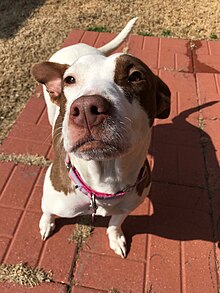| Revision as of 16:27, 6 October 2024 editAnomieBOT (talk | contribs)Bots6,587,767 editsm Dating maintenance tags: {{Citation needed}}← Previous edit | Revision as of 05:11, 14 October 2024 edit undo2603:8001:c2f0:7d0:a8a5:bcaf:5476:2d2 (talk) →Structure and usage: Not everything has to be political. Now everyone’s going to be demonized and called fascist and canceled for saying a funny word. Says a lot about the internet these daysTags: Reverted references removed Mobile edit Mobile web editNext edit → | ||
| Line 10: | Line 10: | ||
| DoggoLingo follows a similar rudimentary style to create its verbs (e.g. ''doin me a'' in place of present participles with the speaker as object, such as ''doin me a scare'' "scaring me") and adjectives (e.g. ''heckin'' in place of degree modifiers such as ''extremely''). 'Heck' is frequently used in place of more conventional expletives.<ref name=":2" /> | DoggoLingo follows a similar rudimentary style to create its verbs (e.g. ''doin me a'' in place of present participles with the speaker as object, such as ''doin me a scare'' "scaring me") and adjectives (e.g. ''heckin'' in place of degree modifiers such as ''extremely''). 'Heck' is frequently used in place of more conventional expletives.<ref name=":2" /> | ||
| Some words also come from ] spellings of English words, such as ''fren'', meaning "friend".<ref name=":2">{{Cite book |last1=Golbeck |first1=Jennifer |last2=Buntain |first2=Cody |chapter=This Paper is About Lexical Propagation on Twitter. H*ckin Smart. 12/10. Would Accept! |title=2018 IEEE/ACM International Conference on Advances in Social Networks Analysis and Mining (ASONAM) |chapter-url=https://ieeexplore.ieee.org/document/8508445 |date=2018 |pages=587–590 |doi=10.1109/ASONAM.2018.8508445 |isbn=978-1-5386-6051-5 |s2cid=53080084 |
Some words also come from ] spellings of English words, such as ''fren'', meaning "friend".<ref name=":2">{{Cite book |last1=Golbeck |first1=Jennifer |last2=Buntain |first2=Cody |chapter=This Paper is About Lexical Propagation on Twitter. H*ckin Smart. 12/10. Would Accept! |title=2018 IEEE/ACM International Conference on Advances in Social Networks Analysis and Mining (ASONAM) |chapter-url=https://ieeexplore.ieee.org/document/8508445 |date=2018 |pages=587–590 |doi=10.1109/ASONAM.2018.8508445 |isbn=978-1-5386-6051-5 |s2cid=53080084 }}</ref> | ||
| == Origin == | == Origin == | ||
Revision as of 05:11, 14 October 2024
Internet language and slang words used to refer to dogs "Doggo" and "Doggos" redirect here. For the animal, see Dog. For actual dog language, see Dog communication.
DoggoLingo is an Internet language that is created from word conversion, meme lexicon, and onomatopoeia. Emerging in the 2010s, DoggoLingo is implied to be a dog's own idiom, and is presented as a canine's thought process. Elyse Graham, assistant professor at Stony Brook University, describes DoggoLingo as "upbeat, joyful, and clueless in a relentlessly friendly way".
Structure and usage
DoggoLingo appends various diminutive suffixes "-o", "-er", "-ino" to existing English words (e.g. dog turns into doggo, pup turns into pupper) as well as DoggoLingo words that have been created (e.g. pupper turns into pupperino). DoggoLingo relies heavily upon onomatopoeia: Words such as mlem or blep describe the action of a dog sticking out its tongue, or other forms of facial expression.
DoggoLingo follows a similar rudimentary style to create its verbs (e.g. doin me a in place of present participles with the speaker as object, such as doin me a scare "scaring me") and adjectives (e.g. heckin in place of degree modifiers such as extremely). 'Heck' is frequently used in place of more conventional expletives.
Some words also come from eye dialect spellings of English words, such as fren, meaning "friend".
Origin
DoggoLingo emerged in the 2010s. Various social media accounts such as WeRateDogs on Twitter and Dogspotting on Facebook, as well as social news aggregation and imageboard websites like 4chan, Reddit, or Tumblr have aided in popularizing the use of DoggoLingo by consistently using or hosting content that uses the lingo on their Internet pages. In 2014, the Dogspotting Facebook account gained popularity, especially in Australia where adding "-o" to the end of words is also a feature of Australian slang. Usage of DoggoLingo peaked around 2017.
Linguist Gretchen McCulloch characterized the language as "taking on characteristics of how people would address their animals in the first place", and noted that it was used by people talking as themselves online, in contrast to the mid-2000s lolcat trend where images of cats were captioned as if the cat were speaking.
Other animals
"Snek" redirects here. For the mechanical fastener known as a sneck, see Latch.
Many other animals are referred to differently in DoggoLingo: for example, one might refer to a snake as a snek or danger noodle, a human as a hooman and a bird as a birb. Fat or rotund birds may be called borbs, while birds with fluffy feathers are referred to as floofs.
See also
References
- ^ "What Does doggo Mean?". Everything After Z by Dictionary.com. Retrieved 2020-04-10.
- "The weird underside of DoggoLingo - OxfordWords blog". OxfordWords blog. 2017-08-01. Archived from the original on 2019-04-02. Retrieved 2018-02-26.
- ^ Boddy, Jessica (April 23, 2017). "Dogs Are Doggos: An Internet Language Built Around Love For The Puppers". NPR. Retrieved October 3, 2021.
- "PUPPER (noun) definition and synonyms". Macmillan Dictionary. Retrieved 2020-04-10.
- "What Does mlem Mean?". Everything After Z by Dictionary.com. Retrieved 2020-04-10.
- "blep Meaning & Origin | Slang by Dictionary.com". Dictionary.com. 2019-05-13. Retrieved 2024-08-06.
- ^ Golbeck, Jennifer; Buntain, Cody (2018). "This Paper is About Lexical Propagation on Twitter. H*ckin Smart. 12/10. Would Accept!". 2018 IEEE/ACM International Conference on Advances in Social Networks Analysis and Mining (ASONAM). pp. 587–590. doi:10.1109/ASONAM.2018.8508445. ISBN 978-1-5386-6051-5. S2CID 53080084.
- "What Does snek Mean?". Dictionary.com. 27 June 2018. Retrieved April 10, 2020.
- ^ Elbein, Asher (December 12, 2019). "When Is a Bird a 'Birb'? An Extremely Important Guide". Audubon. Retrieved October 8, 2022.
- Hannen, Missy (January 16, 2018). "Dogs remind us to be hooman". Vanguard. Retrieved October 8, 2022.
- Mishra, Shubhi (June 22, 2022). "Adorable video of a doggo waiting for his little hooman at bus stop goes viral. Watch". India Today. Retrieved October 8, 2022.
- "What's the Difference Between a 'Borb' and a 'Floof'? | Audubon". www.audubon.org. 2020-03-10. Retrieved 2024-08-06.